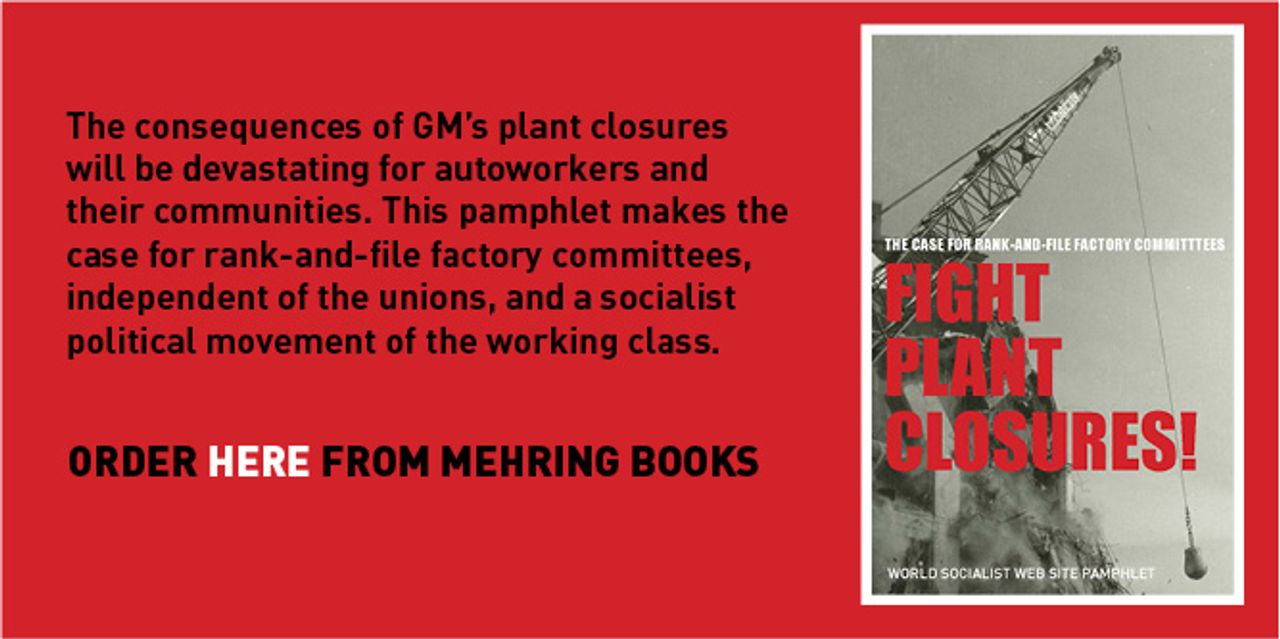Jerry White
Two weeks after the announcement by General Motors that it plans to close five factories in the US and Canada and wipe out nearly 15,000 hourly and white-collar jobs by early next year, industry analysts are warning that GM could shut several more assembly plants.
According to a Detroit Free Press article Monday, two assembly plants in Michigan—Lake Orion, north of Detroit, and Lansing Grand River, along with the Bowling Green, Kentucky, Assembly Plant and the Fairfax Assembly in Kansas City, Kansas—could be targeted for closure because they are running well under full capacity. The factories currently employ 6,238 production workers.
“Hourly workers at four more General Motors factories have reason to worry,” the Free Press wrote. “Industry experts and some in the UAW warn that the factories need more vehicles to build or they could face a similar fate as the three assembly plants GM has said it will idle next year: Detroit-Hamtramck, Lordstown in Ohio and Oshawa in Ontario, plus two U.S. transmission plants.”
On November 26, GM announced the closure of the five plants. CEO Mary Barra said the $6.5 billion in cost savings “will increase the long-term profit and cash generation potential of the company.” The company’s stocks shot up as high as 7.8 percent after the announcement.
GM officials not only defended the previous job cutting announcement but made clear they were prepared to make even more savage moves. “We believe the recent actions move us in the right direction, and we will continue to monitor the market/consumer trends and adjust accordingly,” Kimberly Carpenter, GM spokeswoman, told the Free Press. “As always, our intent is to work with the UAW constructively to address our business challenges in a way that keeps the company competitive in these changing market conditions.”
As of December 2018, the Free Press reported, GM has four of 12 plants, Ford has three of nine plants, and Fiat Chrysler has two of six plants operating below recommended capacity.
“All three—GM, Ford and Fiat Chrysler—likely need to further reduce plant capacity in North America,” Jon Gabrielsen, a market economist who advises automakers and auto suppliers, told the Free Press. “If they talk about keeping one plant open, the companies will have to find another plant to close in North America.”
GM’s job cuts are part of a restructuring of the global auto industry in the face of slowing sales in North America and China and profit losses in Europe and South America. Ford is soon expected to release its own job-cutting plan, which could wipe out as many as 25,000 jobs, largely in Europe. In January, Ford and VW are expected to make a major announcement involving increased integration of their production facilities, which could mark the beginning of a new wave of consolidations.
The new threats are meant to ratchet up pressure on 156,000 GM, Ford and Fiat Chrysler workers whose labor agreements expire on September 13, 2019. After decades of wage and benefit concessions imposed by the United Auto Workers union in the name of “saving” jobs, workers are determined to recoup lost income now that the US automakers have made almost eight straight years of large profits.
Kristin Dziczek of the corporate-funded Center of Automotive Research recently told the industry publication Automotive News that GM’s plant closings “might actually help the membership focus on jobs and survival more than getting more, more and more in terms of raises, benefits and bonuses.”
As it has done in one contract negotiation after another, the United Auto Workers hopes to use the job cut threats to dragoon workers into accepting labor agreements that boost corporate profits and funnel more money to the UAW itself. A significant portion of what has been robbed from autoworkers over the last 40 years has found its way into the more than $1 billion in assets controlled by the UAW in the form of payments recycled through joint labor-management “training centers,” shares in corporate stock and outright bribes.
The Detroit News reported Monday that federal prosecutors may be close to indicting Norwood Jewell, the UAW vice president who oversaw negotiations with Fiat Chrysler in 2015. The contracts pushed through over mass opposition retained the hated two-tier wage system and sharply expanded the number of low-paid, part-time temporary workers.
Jewell has long been suspected of being the unnamed top UAW official known as “UAW-3” in the corruption case, which involved the payment of millions of dollars in bribes to UAW officials by Fiat Chrysler executives.
Sources told the News that Jewell illegally used funds from the UAW-Chrysler National Training Center to pay for more than $10,000 worth of golf resort accommodations in Palm Springs, California, and Disney World tickets. Jewell, who abruptly retired in January after the News linked him to the investigation and his home was searched by federal agents, has been identified as the high-ranking union leader who received approximately $50,000 worth of lavish gifts and benefits from Fiat Chrysler executives.
“The gifts include an Italian shotgun and a $30,000 party that featured strolling models who lit labor leaders’ cigars, all paid for with Fiat Chrysler cash that was supposed to be spent training blue-collar workers,” the News reported.
With anger against the threatened closings erupting against autoworkers, the UAW is working with the Trump administration and various Ohio and Michigan Democrats to blame the job cuts on workers in Mexico, China and even Canada. “GM is a major importer of their own brands from China, Canada and Mexico now sold in the United States,” complained UAW President Gary Jones in The Hill. He urged politicians who have handed billions in tax cuts to GM to “support taxes and trade laws that reward US investment and hold companies accountable for their actions.”
While the UAW is adamantly opposed to any industrial action by workers to stop the plant closings, the Free Press cited the remarks of Marick Masters, a business professor at Wayne State University, who warned that workers might break free from the constraints of the unions: “Look at the wildcat strikes that occurred among teachers in West Virginia and other states. There’s a growing militancy among some workers and people who have reached perhaps the tipping point. People take extreme action when they feel there’s no alternative.”
Ten years after the global financial crash, there are growing signs of working class opposition and anger throughout the US and internationally. The high point is the mass “yellow vest” protests in France against Emmanuel Macron, the “president of the rich.”
The escalating threats of plant closures and layoffs underscores the critical importance of the emergency meeting called by the WSWS Autoworker Newsletter on Sunday to oppose GM plant closings.
The meeting, which included GM, Ford and Fiat Chrysler workers from throughout the Midwest, unanimously endorsed a resolution to fight for the establishment of rank-and-file committees, independent of the UAW, the Canadian Unifor union and other unions, in all the affected workplaces, factories and neighborhoods, to oppose the plant closures.
The resolution said these committees should advance the interests of workers against corporate management and mobilize workers, based on their own demands, including abolishing the two-tier wage system and fighting for industrial democracy. Rejecting the toxic nationalism of the UAW and other unions, the resolution calls for a fight for “the unity of American workers with our class brothers and sisters in Canada, Mexico and the rest of the world.”


No comments:
Post a Comment